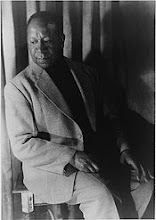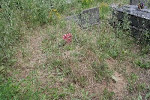by Hanna Gressler
Grèce
(1967) Oil on canvas
© Estate of Beauford Delaney
by permission of Derek L. Spratley, Esquire,
Court Appointed Administrator
Beauford believed that abstraction was the purest form of art. His philosophy is evident in his painting, Greece (Grèce in French), where shape, form, and color become intertwined to create a new world and a new sense of being. The first time I encountered this painting, my mind was immediately engulfed by the intense blue and sporadic color of white that carried me into a new experience of nature.
Eventually, I learned about Beauford’s suicide attempt on a boat to Greece in 1961, which led him to be institutionalized for the first time. Although the painting, Greece, was created six years after the incident, Beauford was troubled by mental illness all his life and the painting may speak of a continuing desire to achieve a sense of unity in oneself and with the world.
The blue of the ocean is all-encompassing. By looking at this painting, you dive into the deep blue and the shifting waves that take you someplace new. The more your eyes drift upward, the lighter the blue becomes as white patches of color become more frequent, and it seems as if the ocean has gradually turned into the sky. Between these blue and white swirls of color lies a horizon filled with more blue – a new world where nature and its colors are intertwined with one another, almost indistinguishable.
And as you stare more closely into this horizon, you become immersed into its everlasting world, where all nature is one and you are one with nature. In this world, the soul transcends the body through this experience of the intense blue of the ocean and the sky, their bodies interlaced, shifting into one another, becoming united.
However, the dark blue of the ocean and its oscillating waves also contain a certain chaos and danger. This new world we are entering is unfamiliar territory. By becoming one with nature, we are unraveling the folds of our body and mind, revealing the darkness within ourselves. Looking into the painting, we are confronted by our deepest desires and fears. If we allow ourselves to be drowned by the heavy blue and chaotic waves, there is no certainty that we will come back. Suddenly, the horizon between the ocean and the sky becomes a bottomless hole that pulls us inward. There is a darkness that lies beyond this world, which we may not be strong enough to confront.
Now, the image of becoming united with nature suggests the necessity for death. The indistinguishable shapes and forms of the painting portray a spectacle of nature, where every body is part of another and another, and together they create one mesmerizing and engulfing world of chaotic nature. It is only through death may return to this nature and nourish the next generation of life.
Whether Beauford jumped into the ocean in order to escape life and become united with nature will never be known. But Greece expresses a yearning for unity – with oneself, with those around us, with nature – despite the darkness that it involves, because it may be only through this way that we achieve peace.
Hanna Gressler is a senior at the American University of Paris. She served as a 2017 summer intern for the Wells International Foundation.
(1967) Oil on canvas
© Estate of Beauford Delaney
by permission of Derek L. Spratley, Esquire,
Court Appointed Administrator
Beauford believed that abstraction was the purest form of art. His philosophy is evident in his painting, Greece (Grèce in French), where shape, form, and color become intertwined to create a new world and a new sense of being. The first time I encountered this painting, my mind was immediately engulfed by the intense blue and sporadic color of white that carried me into a new experience of nature.
Eventually, I learned about Beauford’s suicide attempt on a boat to Greece in 1961, which led him to be institutionalized for the first time. Although the painting, Greece, was created six years after the incident, Beauford was troubled by mental illness all his life and the painting may speak of a continuing desire to achieve a sense of unity in oneself and with the world.
The blue of the ocean is all-encompassing. By looking at this painting, you dive into the deep blue and the shifting waves that take you someplace new. The more your eyes drift upward, the lighter the blue becomes as white patches of color become more frequent, and it seems as if the ocean has gradually turned into the sky. Between these blue and white swirls of color lies a horizon filled with more blue – a new world where nature and its colors are intertwined with one another, almost indistinguishable.
And as you stare more closely into this horizon, you become immersed into its everlasting world, where all nature is one and you are one with nature. In this world, the soul transcends the body through this experience of the intense blue of the ocean and the sky, their bodies interlaced, shifting into one another, becoming united.
However, the dark blue of the ocean and its oscillating waves also contain a certain chaos and danger. This new world we are entering is unfamiliar territory. By becoming one with nature, we are unraveling the folds of our body and mind, revealing the darkness within ourselves. Looking into the painting, we are confronted by our deepest desires and fears. If we allow ourselves to be drowned by the heavy blue and chaotic waves, there is no certainty that we will come back. Suddenly, the horizon between the ocean and the sky becomes a bottomless hole that pulls us inward. There is a darkness that lies beyond this world, which we may not be strong enough to confront.
Now, the image of becoming united with nature suggests the necessity for death. The indistinguishable shapes and forms of the painting portray a spectacle of nature, where every body is part of another and another, and together they create one mesmerizing and engulfing world of chaotic nature. It is only through death may return to this nature and nourish the next generation of life.
Whether Beauford jumped into the ocean in order to escape life and become united with nature will never be known. But Greece expresses a yearning for unity – with oneself, with those around us, with nature – despite the darkness that it involves, because it may be only through this way that we achieve peace.
Hanna Gressler is a senior at the American University of Paris. She served as a 2017 summer intern for the Wells International Foundation.




No comments:
Post a Comment